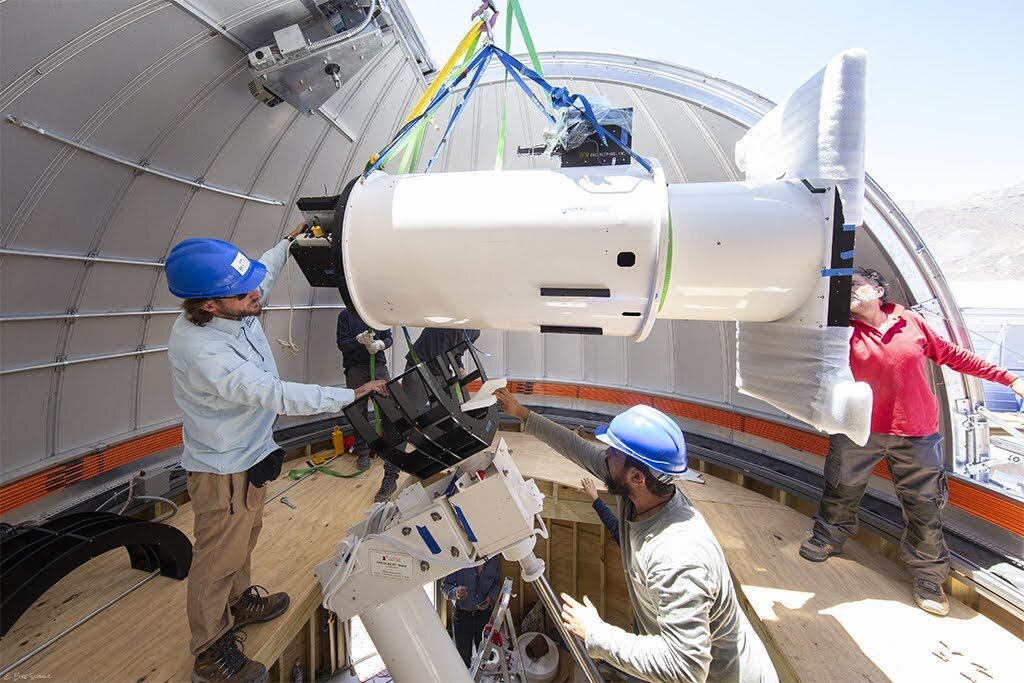By University of Hawaii at Manoa
A state-of-the-art asteroid alert system operated by the University of Hawaii Institute for Astronomy (IfA) can scan the entire dark sky every 24 hours for dangerous bodies that could hurtle toward Earth.
The NASA-funded Asteroid Terrestrial-impact Last Alert System (ATLAS) has expanded its reach to the southern hemisphere, from two existing northern hemisphere telescopes on Hawaiian volcanoes Haleakalā and Maunaloa. Construction is complete, and operations are under way on telescopes in South Africa and Chile.
“An asteroid that hits the Earth can come at any time from any direction, so ATLAS is now all the sky, all the time,” said John Tonry, IfA professor and ATLAS principal investigator.
The new telescopes are located at Sutherland Observing Station in South Africa, and El Sauce Observatory in Chile. These locations were selected not only for their access to the southern part of the sky but their time difference from Hawaii – they are able to observe at night when it is daytime in Hawaii. The four-telescope ATLAS system is the first survey for hazardous asteroids capable of monitoring the entire dark sky every 24 hours. The modest-sized telescopes can capture a chunk of sky 100 times larger than the full moon in a single exposure.
The ATLAS system can provide one day’s warning for a 20-metre diameter asteroid, capable of city-level destruction. Since larger asteroids can be detected farther away, ATLAS can provide up to three weeks’ warning for a 100-metre asteroid, capable of wide regional devastation. An asteroid that large could produce 10 times the destruction of the recent Hunga Tonga volcano eruption if it were to strike the Earth.
UH developed the first two ATLAS telescopes under a 2013 grant from NASA’s Near-Earth Objects Observations Program, now part of the Planetary Defense Coordination Office. The two facilities, on Haleakalā and Maunaloa, became fully operational in 2017.
After several years of successful operation in Hawaii, IfA proposed for additional NASA funds to build two more telescopes in the southern hemisphere. IfA sought partners to host these telescopes, and selected the South African Astronomical Observatory (SAAO) in South Africa and a multi-institutional collaboration in Chile. The ATLAS presence augments already substantial astronomical capability in both countries.
Despite delays due to COVID-19 travel restrictions and supply-chain complications, the UH ATLAS team remotely supervised the assembly of the ATLAS telescopes in co-ordination with international collaborators in South Africa and Chile. In South Africa, the construction effort was led by the SAAO, and in Chile the team consisted of multiple partners, including the Millennium Institute for Astrophysics and Obstech, which operates the private El Sauce Observatory.
On January 22, ATLAS-Sutherland in South Africa discovered its first near-Earth object (NEO), 2022 BK, a 100-metre asteroid that poses no threat to Earth. To date, the ATLAS system has discovered more than 700 near-Earth asteroids and 66 comets, including detection of 2019 MO and observations of 2018 LA, two very small asteroids that actually struck the Earth. The system is specially designed to detect objects that approach very close to Earth – closer than the distance to the Moon, about 384,000 kilometers away.
https://phys.org/news/2022-01-uh-asteroid-tracking-entire-sky.html


